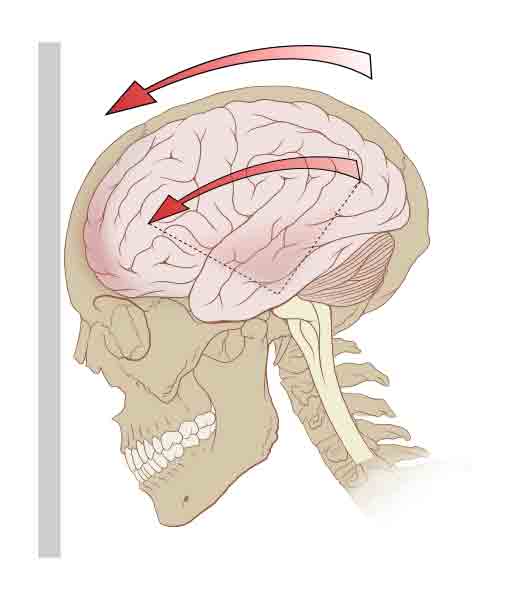A new blood biomarker correctly predicted which concussion victims went on to have white matter tract structural damage and persistent cognitive dysfunction following a mild traumatic brain injury (mTBI).
Researchers in the Perelman School of Medicine at the University of Pennsylvania, in conjunction with colleagues at Baylor College of Medicine, found that the blood levels of a protein called calpain-cleaved αII-spectrin N-terminal fragment (SNTF) were twice as high in a subset of patients following a traumatic injury. If validated in larger studies, this blood test could identify concussion patients at increased risk for persistent cognitive dysfunction or further brain damage and disability if returning to sports or military activities.
More than 1.5 million children and adults suffer concussions each year in the United States, and hundreds of thousands of military personal endure these mild traumatic brain injuries worldwide. Current tests are not capable of determining the extent of the injury or whether the injured person will be among the 15-30 percent who experience significant, persistent cognitive deficits, such as processing speed, working memory and the ability to switch or balance multiple thoughts.
“New tests that are fast, simple, and reliable are badly needed to predict who may experience long-term effects from concussions, and as new treatments are developed in the future, to identify who should be eligible for clinical trials or early interventions,” said lead author Robert Siman, PhD, research professor of Neurosurgery at Penn. “Measuring the blood levels of SNTF on the day of a brain injury may help to identify the subset of concussed patients who are at risk of persistent disability.”
In a study published yesterday in Frontiers in Neurology, Penn and Baylor researchers evaluated blood samples and diffusion tensor images from a subgroup of 38 participants in a larger study of mTBI with ages ranging from 15 to 25 years old. 17 had sustained a head injury caused by blunt trauma, acceleration or deceleration forces, 13 had an orthopaedic injury, and 8 were healthy, uninjured, demographically matched controls.
In taking neuropsychological and cognitive tests over the course of three months, results within the mTBI group varied considerably, with some patients performing as well as the healthy controls throughout, while others showed impairment initially that resolved by three months, and a third group with cognitive dysfunction persisting through three months. The nine patients who had abnormally high levels of SNTF (7 mTBI and 2 orthopaedic patients) also had significant white matter damage apparent in radiological imaging.
“The blood test identified SNTF in some of the orthopaedic injury patients as well, suggesting that these injuries could also lead to abnormalities in the brain, such as a concussion, that may have been overlooked with existing tests,” said Douglas Smith, MD, director of the Penn Center for Brain Injury and Repair and professor of Neurosurgery. “SNTF as a marker is consistent with our earlier research showing that calcium is dumped into neurons following a traumatic brain injury, as SNTF is a marker for neurodegeneration driven by calcium overload.”
The blood test given on the day of the mild traumatic brain injury showed 100 percent sensitivity to predict concussions leading to persisting cognitive problems, and 75 percent specificity to correctly rule out those without functionally harmful concussions. If validated in larger studies, a blood test measuring levels of SNTF could be helpful in diagnosing and predicting risk of long term consequences of concussion.
 The Penn and Baylor researchers hope to determine the robustness of these findings with a second larger study, and determine the best time after concussion to measure SNTF in the blood in order to predict persistent brain dysfunction. The team also wants to evaluate their blood test for identifying when repetitive concussions begin to cause brain damage and persistent disability.
The Penn and Baylor researchers hope to determine the robustness of these findings with a second larger study, and determine the best time after concussion to measure SNTF in the blood in order to predict persistent brain dysfunction. The team also wants to evaluate their blood test for identifying when repetitive concussions begin to cause brain damage and persistent disability.
The team includes, from Penn: Robert Siman, Nicholas Giovannone and Douglas Smith; and from Baylor College of Medicine: Gerri Hanten, Elisabeth Wilde, Steven McCauley, Jill Hunter, Xiaoqi Li and Harvey Levin. Funding was provided by the National Institute of Neurologic Disorders and Stroke (P01 NS056202).




If I were to have some questions regarding my own condition and this test, how and whom would I contact? They are valid questions and I do meet the criteria(n).
Thanks,
Anthony S.
But Brainings arte so lucrative to the NHL!